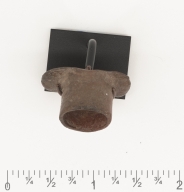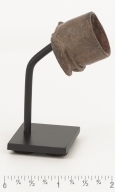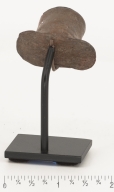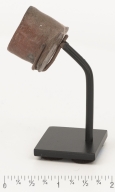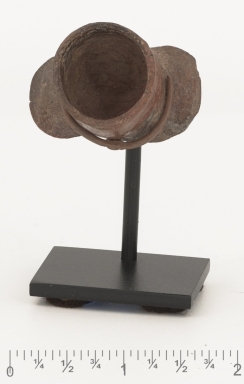Who What Where WhenWHAT
WHO |
REFINE
Browse All : 3.45 in high x 2.2 in wide x 1.9 in deep
1-5 of 5
Title
Labret.
Description
The elite of Mesoamerica were allowed to wear certain kinds of body adornments. Different adornments and materials marked a person's elite status. Labrets were worn below the bottom lip. A piercer was used to make the hole and the hole was stretched over time. This labret is very unusual -- it is not made of black obsidian, which would have taken a long time to make. This labret is made of clay. It is highly polished, which has compacted the clay before firing. The wings on the circular area kept the labret from falling out. The circular hollow area was inlaid with precious materials such as pyrite, shell, obsidian, or turquoise.
Subject
[Ceramic jewelry--Mexico--Colima (State), Labrets, Art--Mexico--Colima (State), Indigenous peoples--Antiquities]
Date
between 900 and 1519
Title
Labret.
Description
The elite of Mesoamerica were allowed to wear certain kinds of body adornments. Different adornments and materials marked a person's elite status. Labrets were worn below the bottom lip. A piercer was used to make the hole and the hole was stretched over time. This labret is very unusual -- it is not made of black obsidian, which would have taken a long time to make. This labret is made of clay. It is highly polished, which has compacted the clay before firing. The wings on the circular area kept the labret from falling out. The circular hollow area was inlaid with precious materials such as pyrite, shell, obsidian, or turquoise.
Subject
[Ceramic jewelry--Mexico--Colima (State), Labrets, Art--Mexico--Colima (State), Indigenous peoples--Antiquities]
Date
between 900 and 1519
Title
Labret.
Description
The elite of Mesoamerica were allowed to wear certain kinds of body adornments. Different adornments and materials marked a person's elite status. Labrets were worn below the bottom lip. A piercer was used to make the hole and the hole was stretched over time. This labret is very unusual -- it is not made of black obsidian, which would have taken a long time to make. This labret is made of clay. It is highly polished, which has compacted the clay before firing. The wings on the circular area kept the labret from falling out. The circular hollow area was inlaid with precious materials such as pyrite, shell, obsidian, or turquoise.
Subject
[Ceramic jewelry--Mexico--Colima (State), Labrets, Art--Mexico--Colima (State), Indigenous peoples--Antiquities]
Date
between 900 and 1519
Title
Labret.
Description
The elite of Mesoamerica were allowed to wear certain kinds of body adornments. Different adornments and materials marked a person's elite status. Labrets were worn below the bottom lip. A piercer was used to make the hole and the hole was stretched over time. This labret is very unusual -- it is not made of black obsidian, which would have taken a long time to make. This labret is made of clay. It is highly polished, which has compacted the clay before firing. The wings on the circular area kept the labret from falling out. The circular hollow area was inlaid with precious materials such as pyrite, shell, obsidian, or turquoise.
Subject
[Ceramic jewelry--Mexico--Colima (State), Labrets, Art--Mexico--Colima (State), Indigenous peoples--Antiquities]
Date
between 900 and 1519
Title
Labret.
Description
The elite of Mesoamerica were allowed to wear certain kinds of body adornments. Different adornments and materials marked a person's elite status. Labrets were worn below the bottom lip. A piercer was used to make the hole and the hole was stretched over time. This labret is very unusual -- it is not made of black obsidian, which would have taken a long time to make. This labret is made of clay. It is highly polished, which has compacted the clay before firing. The wings on the circular area kept the labret from falling out. The circular hollow area was inlaid with precious materials such as pyrite, shell, obsidian, or turquoise.
Subject
[Ceramic jewelry--Mexico--Colima (State), Labrets, Art--Mexico--Colima (State), Indigenous peoples--Antiquities]
Date
between 900 and 1519
1-5 of 5
|
